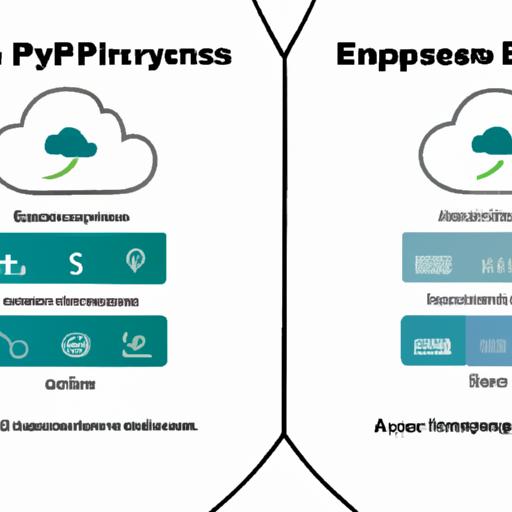
Introduction
In the fast-paced world of business operations, efficiency is key. This is where Enterprise Resource Planning (ERP) systems come into play. But with the plethora of options available, how do you navigate the choice between on-premise and cloud-based ERP systems? Let’s delve into the world of ERP to understand the nuances and importance of selecting the right system for your business needs.
ERP, in its essence, is a suite of integrated applications that help streamline and automate business processes, such as accounting, human resources, and supply chain management. It serves as a centralized hub for data management, facilitating better decision-making and enhancing overall productivity. When it comes to ERP systems, the two main contenders are on-premise and cloud-based solutions, each with its own set of advantages and considerations.
Choosing the right ERP system is a critical decision that can significantly impact your business operations. Whether you opt for the control and security of an on-premise solution or the flexibility and scalability of the cloud, understanding the implications of each is paramount. Let’s explore the intricacies of on-premise versus cloud-based ERP systems to help you make an informed choice tailored to your business requirements.
Understanding On-Premise ERP
Definition of On-Premise ERP
On-premise ERP refers to a traditional deployment model where the software and hardware infrastructure are installed and maintained on-site within the company’s premises. This setup offers complete control and customization over the ERP system, allowing businesses to tailor the software to their specific needs and requirements.
Advantages and Disadvantages of On-Premise ERP
One of the primary advantages of on-premise ERP is data security. With sensitive information stored locally, businesses have greater control over access and protection of their data. Additionally, on-premise solutions typically offer higher levels of customization and integration with existing systems, providing a more tailored approach to ERP implementation.
However, on-premise ERP systems come with their own set of challenges. The upfront costs associated with hardware, software licenses, and implementation can be significant, making it a substantial investment for businesses. Maintenance and upgrades also fall under the responsibility of the company, requiring dedicated IT resources and expertise to ensure smooth operation over time.
Cost Considerations
When considering on-premise ERP solutions, it’s essential to factor in both the initial investment and long-term costs. Upfront expenses include hardware procurement, software licenses, implementation, and training costs. Ongoing expenses such as maintenance, upgrades, and support services should also be considered to determine the total cost of ownership for an on-premise ERP system.
Security Features
Data security is a critical aspect of any ERP system, especially for businesses handling sensitive information. On-premise ERP solutions offer a higher level of security as data is stored locally and under the direct control of the company. Companies can implement stringent security measures and protocols to safeguard their data from external threats and breaches, ensuring compliance with industry regulations and standards.
Exploring Cloud-Based ERP
Definition of Cloud-Based ERP
Cloud-based ERP refers to an ERP system that is hosted on remote servers and accessed through the internet. This modern approach eliminates the need for on-site hardware and infrastructure, allowing businesses to leverage software applications and store data in the cloud. The cloud-based model offers a centralized platform for real-time data access and collaboration, making it an attractive option for businesses seeking agility and efficiency.
Advantages and Disadvantages of Cloud-Based ERP
One of the primary advantages of cloud-based ERP is its accessibility and flexibility. With information stored in the cloud, users can access data from anywhere, at any time, using any device with an internet connection. This level of mobility enhances productivity and enables seamless collaboration among team members. Additionally, cloud-based ERP systems are known for their scalability, allowing businesses to easily adjust resources based on their evolving needs.
However, cloud-based ERP systems also come with their own set of challenges. Security concerns are a common apprehension, as data stored in the cloud may be vulnerable to cyber threats. Furthermore, ongoing subscription costs can accumulate over time, potentially exceeding the initial investment of an on-premise solution. It is essential for businesses to carefully evaluate the advantages and disadvantages of cloud-based ERP to determine if it aligns with their operational requirements and long-term goals.
Factors to Consider When Choosing Between On-Premise and Cloud ERP
Business Size and Industry
The size and nature of your business play a vital role in determining the most suitable ERP solution. Large enterprises with complex operations may find on-premise ERP systems more accommodating due to their robust customization capabilities and control over data. Conversely, smaller businesses or startups may benefit from the agility and cost-effectiveness of cloud-based solutions, allowing them to scale their operations as they grow.
Budget Constraints
Budget considerations are paramount when selecting an ERP system. On-premise solutions typically involve high upfront costs for hardware, software licenses, and maintenance. On the other hand, cloud-based ERP systems offer a subscription-based model, enabling businesses to pay for what they use and scale resources as needed. Understanding your budget constraints and long-term financial commitments is essential in making an informed decision between on-premise and cloud ERP options.
IT Infrastructure and Resources
Assessing your existing IT infrastructure and resources is crucial in determining the feasibility of implementing on-premise or cloud-based ERP systems. On-premise solutions require dedicated hardware, IT personnel, and maintenance, which may strain resources for some organizations. In contrast, cloud ERP solutions alleviate the burden of infrastructure management, allowing businesses to focus on core operations. Considering your IT capabilities and readiness to adopt new technologies is key in selecting the right ERP solution for your business.
Future Scalability and Growth
Anticipating future scalability and growth is essential when choosing an ERP system. On-premise solutions may offer greater customization and control but could pose limitations in scalability as your business expands. Cloud-based ERP systems provide the flexibility to scale resources on-demand, accommodating growth without major infrastructure investments. Evaluating your long-term business objectives and growth projections is imperative in ensuring your chosen ERP solution can evolve with your organization.
Conclusion
As we conclude our exploration of on-premise versus cloud-based ERP systems, it is evident that the choice between the two hinges on various factors unique to each business. The key differences between on-premise and cloud ERP systems encompass deployment and maintenance, customization options, accessibility, mobility, as well as data security and compliance. Each aspect plays a crucial role in determining the most suitable solution for your business needs.
The decision to opt for an on-premise or cloud-based ERP system is not one to be taken lightly. Considerations such as business size, budget constraints, IT infrastructure, and future scalability are vital in making an informed choice. Consulting with IT professionals and weighing the pros and cons of each system is imperative to ensure a seamless transition and optimal performance.
In the dynamic landscape of business operations, the right ERP system can be a game-changer, enhancing efficiency, productivity, and overall success. By understanding the nuances and benefits of on-premise and cloud ERP solutions, you can embark on a journey towards streamlined processes, improved decision-making, and sustainable growth. Choose wisely, and let your ERP system propel your business to new heights of success.


